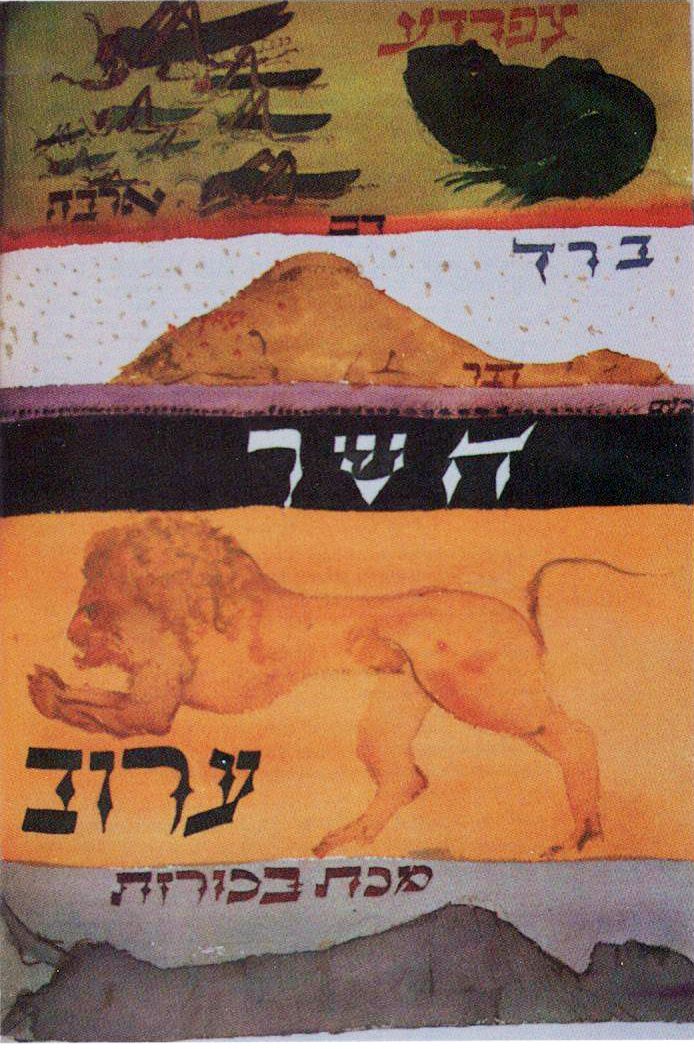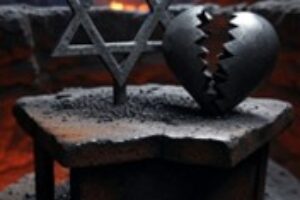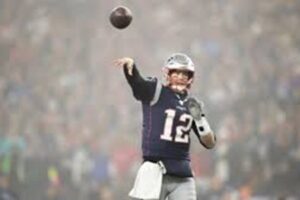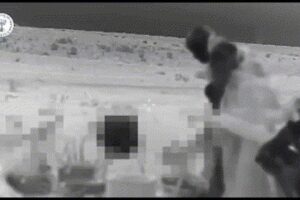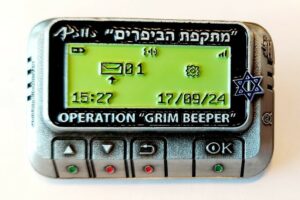The Ten Plagues and their connection to the cycle from water to ground to sky to soul:
At my 2019 Passover Seder, my nephew Myles asked me,
- “Uncle Andy, what do the ten plagues mean?”
This led me to ask two questions:
- “What was the meaning of the each of ten plagues?”
- “Who was affected by the ten plagues?”
What was the meaning of the ten plagues?
I would like to share my interpretation about the plagues, as they transition from the water to the air, and the significance of that shift. The order of the plagues is deeply connected to the distinction between the physical and the spiritual. In fact, the plagues progressed from existing in roots in the ground, to the water, to the sky, and finally to the soul. This idea can be seen clearly in the progression of the plagues:
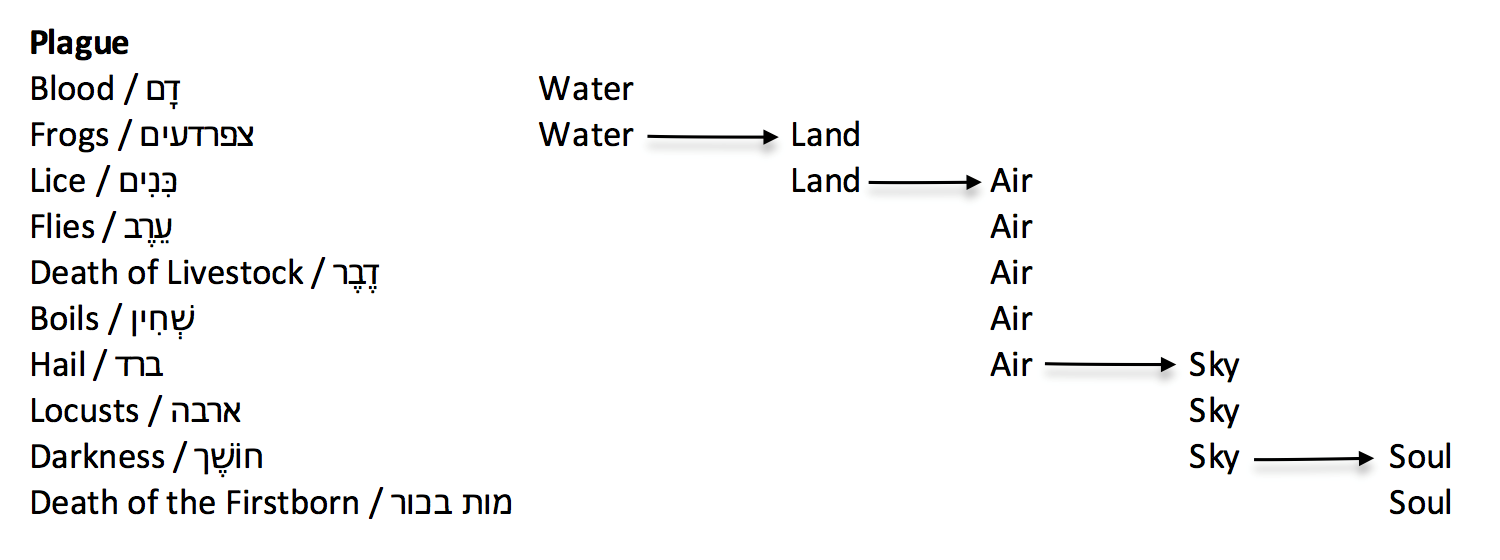
Who was affected by the ten plagues?
At this Seder, my 10-year-old nephew Myles explained that, with regards to whom the plagues affected, he was taught that the plagues only affected the Egyptians, as a form of punishment from God. The Hebrew Slaves were not believed to have been impacted.
I have a different interpretation. I believe the first 3 plagues affected everyone in Egypt — both Egyptians and Hebrew Slaves, while the following 5 plagues only affected the Egyptians. The final two plagues, darkness and slaying of the first born, did not impact those that chose to leave Egypt and cross the Sea of Reeds/Red Sea (Numbers 21:4) in order to become Israelites/Children of Israel. Those who placed blood on their lintel enjoyed “lightness” in their homes and the angel of death “passed over” their homes and spared their firstborns.
The concept laid out in this story illustrates how everyone was affected by the plagues in different ways. While some Hebrew slaves left Egypt, others chose to stay. While many Hebrew slaves chose to mark their lintels with lambs’ blood and escape from Egypt, others stayed behind. They remained enslaved to both their mental and physical servitude — unable to imagine the Promised Land and, therefore, unable to take the actions necessary to reach it. Not all Egyptians remained in Egypt; some decided to join the Hebrew slaves in their journey across the Sea of Reeds and, as a result, became Israelites in the Wilderness.
Pharaoh is the ultimate example of someone enslaved to the status quo; in this case, the idea that he would always have slaves. Read more about Pharaoh here.
The traditional interpretation of the plagues as impacting only the Egyptians may lead us to believe that people are so innately different that disparate treatment based on origin and background is justified. It also promotes the idea that we are locked into a predetermined fate. I believe that some Egyptians decided to mark their lintel and join the crossing of the Sea of Reeds, joining the Hebrew Slaves in pursuit of the Promised Land and illustrating the ability for all, regardless of origin, to pursue greatness.
My belief is that all who crossed the Sea of Reeds / Red Sea became Israelites — regardless of background (Exodus 10:19). This concept is based on the fundamental tenet that redemption in the Promised Land is available to all who commit to faith and practice as a community. The Promised Land is neither guaranteed to some, nor restricted from others. I hope that considering these different perspectives expands your outlook on the possibilities and potential of the Promised Land – Eretz Yisrael.
You can read more about the story of Exodus here.
Torah References for Discussion:
Torah references of the 10 Plagues and whom they affected:
- Water to Blood – דָם (“dom”) Exodus 7:14-24
“And the LORD said unto Moses: ‘Say unto Aaron: Take thy rod, and stretch out thy hand over the waters of Egypt, over their rivers, over their streams, and over their pools, and over all their ponds of water, that they may become blood; and there shall be blood throughout all the land of Egypt, both is vessels of wood and in vessels of stone.’”
In our interpretation, everyone (Hebrew Slaves and Egyptians) was affected by this plague. Please see the following reference:
Exodus 7: 21-22
“And the fish that were in the river died; and the river became found, and the Egyptians could not drink water from the river; and the blood was throughout all the land of Egypt. And the magicians of Egypt did in like manner with their secret arts; and Pharaoh’s heart was hardened, and he hearkened not unto them; as the LORD had spoken”
- Frogs – צפרדעים (“tzefardeim”) Exodus 7:25-8:15
“And the LORD spoke unto Moses: ‘Go in unto Pharaoh, and say unto him: Thus saith the LORD: Let My people go, that they may serve Me. And if thou refuse to let them go, behold, I will smite all thy borders with frogs.”
In our interpretation everyone (Hebrew Slaves and Egyptians) was affected by this plague. Please see the following reference:
Exodus 8:6-7
“And Aaron stretched out his hand over the waters of Egypt; and the frogs came up, and covered the land of Egypt. And the magicians did in like manner with their secret arts, and brought up the frogs upon the land of Egypt.”
- Lice or gnats – כִּנִים (“kinim”) Exodus 8:16-19
“And the LORD said unto Moses: ‘Say unto Aaron: Stretch out thy rod, and smite the dust of earth, that it may become gnats throughout all the land of Egypt.’”
In our interpretation, everyone (Hebrew Slaves and Egyptians) was affected by this plague. Please see the following reference:
Exodus 8:18
“But when the magicians tried to produce gnats by their secret arts, they could not. Since the gnats were on people and animals everywhere,”
- Wild animals or flies – עֵרֶב (“arov”) Exodus 8:20-32
“Else, if thou wilt not let My people go, behold, I will send swarms of flies upon thee, and upon thy servants, and upon thy people, and into thy houses; and the houses of the Egyptians shall be full of swarms of flies, and also the ground whereon they are.”
In our interpretation, this plague did not affect the Israelites. Please see the following reference:
Exodus 8:21-22
“Else, if thou wilt not let My people go, behold, I will send swarms of flies upon thee, and upon thy servants, and upon thy people, and into thy houses; and the houses of the Egyptians shall be full of swarms of flies, and also the ground whereon they are. And I will set apart in that day the land of Goshen, in which My people dwell, that no swarms of flies shall be there; to the end that thou mayest know that I am the LORD in the midst of the earth.”
- Pestilence of livestock – דֶבֶר (“dever”) Exodus 9:1-7
“behold, the hand of the LORD is upon thy cattle which are in the field, upon the horses, upon the asses, upon the camels, upon the herds, and upon the flocks; there shall be a very grievous murrain.”
In our interpretation, this plague did not affect the Hebrew Slaves. Please see the following reference:
Exodus 9:2-6
“For if thou refuse to let them go, and wilt hold them still, behold, the hand of the LORD is upon thy cattle which are in the field, upon the horses, upon the asses, upon the camels, upon the herds, and upon the flocks; there shall be a very grievous murrain. And the LORD shall make a division between the cattle of Israel and the cattle of Egypt; and there shall nothing die of all that belongeth to the children of Israel.’ And the LORD appointed a set time, saying: ‘Tomorrow the LORD shall do this thing in the land.’ And the LORD did that thing on the morrow, and all the cattle of Egypt died; but the cattle of the children of Israel died not one.”
- Boils – שְׁחִין (“shechin”) Exodus 9:8-12
“And it shall become small dust over all the land of Egypt, and shall be a boil breaking forth with blains upon man and upon beast, throughout all the land of Egypt.”
In our interpretation, this plague did not affect the Hebrew Slaves. Please see the following reference:
Exodus 9:8-11
And the LORD said unto Moses and unto Aaron: ‘Take to you handfuls of soot of the furnace, and let Moses throw it heavenward in the sight of Pharaoh. And it shall become small dust over all the land of Egypt, and shall be a boil breaking forth with blains upon man and upon beast, throughout all the land of Egypt.’ And they took soot of the furnace and stood before Pharaoh; and Moses threw it up heavenward; and it became a boil breaking forth with blains upon man and upon beast. And the magicians could not stand before Moses because of the boils; for the boils were upon the magicians, and upon all the Egyptians.”
- Thunderstorm of hail and fire –ברד (“barad”) Exodus 9:13-35
“Behold, tomorrow about this time I will cause it to rain a very grievous hail, such as hath not been in Egypt since the day it was founded even until now.”
In our interpretation, this plague did not affect the Hebrew Slaves. Please see the following reference:
Exodus 9:25-26
“And the hail smote throughout all the land of Egypt all that was in the field, both man and beast; and the hail smote every herb of the field, and broke every tree of the field. Only in the lane of Goshen, where the children of Israel were, was there no hail.”
- Locusts – ארבה (“arbeh”) Exodus 10:1-20
“Else, if thou refuse to let My people go, behold, to-morrow will I bring locusts into thy border;”
In our interpretation, this plague did not affect the Hebrew Slaves. Please see the following reference:
Exodus 10:14
“And the locusts went up over all the land of Egypt, and rested in all the borders of Egypt; every grievous were they; before them there were no such locusts as they, neither after them shall be such.
- Darkness for three days – חוֹשֶׁך (“choshech”) Exodus 10:21-29
“And the LORD said unto Moses: ‘Stretch out thy hand toward heaven, that there may be darkness over the land of Egypt, even darkness which may be felt.’ And Moses stretched forth his hand toward heaven and there was a thick darkness in all the land of Egypt three days;”
In our interpretation, during this plague, everyone (Hebrew Slaves and Egyptians must make a decision of whether or not to obey G-d. Please see the following reference:
Exodus 10:23
“they saw not one another, neither rose any from his place for three days; but all the children of Israel had light in their dwellings.”
- Death of the firstborn – מות בכור (“moot bechor”) Exodus 11:1-12:36
“and all the first-born in the land of Egypt shall die, from the first-born of Pharaoh that sitteth upon his throne, even unto the first-born of the maid-servant that is behind the mill; and all the first-born of cattle.”
In our interpretation, during this plague, everyone (Hebrew Slaves and Egyptians must make a decision of whether or not to obey G-d. Please see the following reference:
Exodus 12:12-13
“For I will go through the land of Egypt in that night, and will smite all the first-born in the land of Egypt, both man and beast; and against all the gods of Egypt I will execute judgements: I am the LORD. And the blood shall be to you for a token upon the houses where ye are; and when I see the blood, I will pass over you, and there shall no plague be upon you to destroy you, when I smite the land of Egypt.”
In our interpretation, the “Israelites” in the wilderness is comprised of both Hebrew slaves who left Egypt and also some Egyptians who, together, became the Children of Israel, wandering in the wilderness and, ultimately, seeking the Promised Land:
Exodus 12:37-38
“And the children of Israel journeyed from Rameses to Succoth, about six hundred thousand men on foot, beside children. And a mixed multitude went up also with them; and flocks, and herds, even very much battle.”
Leviticus 24:10-16
“And the son of an Israelite woman, whose father was an Egyptian, went out among the children of Israel; and the son of the Israelitish woman and a man of Israel strove together in the camp.”
Numbers 11:5
“And the mixed multitude that was among them fell a lusting; and the children of Israel also wept”

